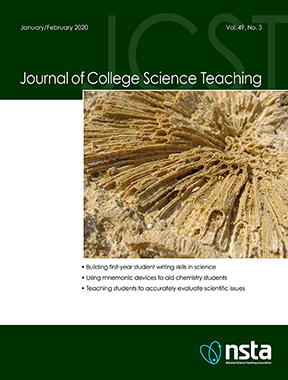Journal of College Science Teaching—January/February 2020

Volume 49, No. 3, January/February 2020
Journal Article
Student-Constructed Weather Instruments Facilitate Scientific Inquiry
Students in introductory college science courses often have a simplified understanding of the scientific method. To introduce students to the complexity of the scientific process and the value of empirical observations, I implemented a semesterlong...
By Cindy Shellito
Journal Article
Evaluating Information: The Impact of Major, Class Standing, and Experience With Primary Literature
Social media platforms and other internet sites may propagate inaccurate or misleading information. This misinformation encourages speculation, rumors, and mistrust in established science. In the current study, we attempted to determine whether bio...
By Shawn Stover and Michelle Mabry
Journal Article
A Team-Taught Interdisciplinary First-Year Seminar With a Focus on Blood
First-Year Seminars (FYS) offer a unique mode of introducing college students to new topics, research practices, and approaches to learning that they may not have been exposed to in high school. In this article, we outline the successes and challen...
By Adele J. Wolfson and Justin Armstrong
Journal Article
Chemical mnemonic devices have been designed to aid students in understanding chemical concepts in previous years. This has been done for concepts such as oxyanions, ozonolysis, tautomerization mechanisms in organic chemistry, and writing reactions o...
By Angela L. Mahaffey
Journal Article
Teamwork Makes the Dream Work: Using Team-Based Learning in the Science Classroom
With an overwhelming amount of research and a demand for collaborative learning in the classroom, teachers are tackling challenges at all educational levels that often accompany the social aspects of group work. Team-Based Learning (TBL) is an inst...
By Virginia J. Moore, Elizabeth Mitchell Prewitt, Amber Jean Carpenter-McCullough, and Brooke A. Whitworth
Journal Article
With calls to reassess higher education teaching methods, active learning practices have quickly become a popular alternative to traditional lectures, especially in STEM courses that traditionally rely heavily on large-lecture formats. In this rega...
By William C. Beckerson, Jennifer O. Anderson, John D. Perpich , and Debbie Yoder-Himes
Journal Article
Studies on the effectiveness of clickers in undergraduate chemistry courses are mixed, and there is disagreement on how to effectively leverage clickers to improve student learning performance. To fill a gap in the research, we analyzed three diffe...
By David J. Weiss, Patrick McGuire, Wendi Clouse, and Raphael Sandoval
Journal Article
Building First-Year Science Writing Skills With an Embedded Writing Instruction Program
An important foundational skill developed in an undergraduate science program is the ability to find, critically evaluate, and communicate scientific information. Effective science communication depends on good writing; therefore, we leveraged stud...
By David Dansereau, L. E. Carmichael, and Brian Hotson


